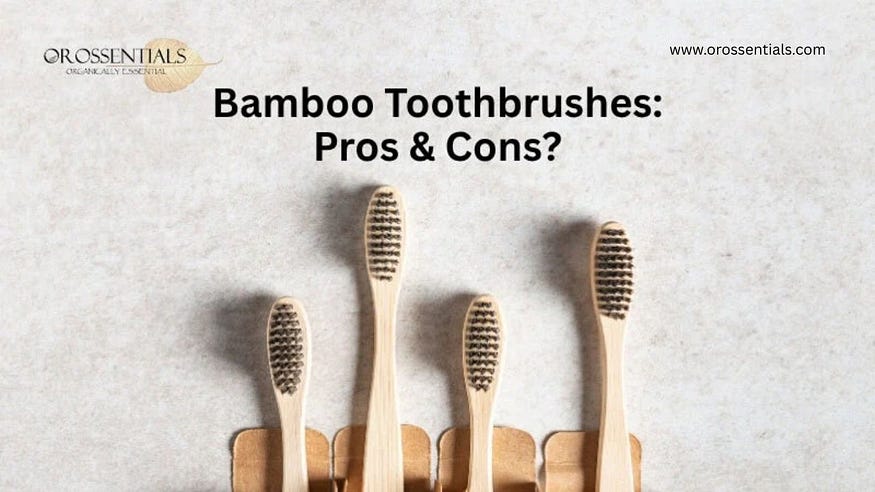In 2025, sustainability is no longer a trend — it’s a lifestyle. As more Indians look for eco-friendly alternatives in their daily routines, bamboo toothbrushes have emerged as a popular choice. But are they truly better than plastic? In this ultimate guide, we’ll break down the pros & cons of using a bamboo toothbrush, how bamboo compares to plastic, and the right way to practice eco-friendly disposal.

Why Switch to Bamboo Toothbrushes?
India generates thousands of tonnes of plastic waste every year, and dental hygiene contributes to it more than we realize. A single plastic toothbrush can take up to 500 years to decompose. In contrast, bamboo is biodegradable, renewable, and widely available across India.
Brands like Orossentials are making bamboo toothbrushes more accessible, stylish, and effective — so consumers don’t have to compromise on oral hygiene while caring for the planet.
Pros & Cons of Using a Bamboo Toothbrush
Like any sustainable product, bamboo toothbrushes come with their advantages and drawbacks. Let’s look at both sides clearly.
✅ Pros
- Eco-Friendly Material — Bamboo is biodegradable and naturally renewable.
- Health Benefits — Bamboo has antimicrobial properties that reduce bacterial growth on handles.
- Stylish and Natural — A sleek, earthy look that appeals to eco-conscious users.
- Affordable Options in India — Local brands like Orossentials make them cost-competitive with plastic brushes.
❌ Cons
- Bristles Are Not Always Biodegradable — Most bamboo toothbrushes use nylon bristles, which need to be separated before disposal.
- Maintenance Needed — Bamboo can absorb water and may require air-drying to avoid mold.
- Limited Availability in Rural Markets — While online availability is growing, small towns still rely heavily on plastic brushes.
How Bamboo Compares to Plastic
When we compare bamboo toothbrushes with plastic ones, the difference is striking:
- Environmental Impact: Bamboo wins with its biodegradable handle, while plastic lingers in landfills for centuries.
- Cost: Plastic is cheaper upfront, but bamboo is catching up in India with competitive pricing.
- Durability: Both last 2–3 months with proper care, as recommended by dentists.
- Aesthetic Appeal: Bamboo brushes look natural and minimalistic, unlike brightly colored plastics.
In short, bamboo toothbrushes strike a balance between function and sustainability, especially when sourced from trusted brands like Orossentials.
Eco-Friendly Disposal of Bamboo Toothbrushes
One of the biggest questions is: What do you do with a bamboo toothbrush after use?
Here’s a simple eco-friendly disposal process:
- Remove the bristles (usually nylon) with pliers.
- Compost the bamboo handle in your home compost bin or bury it in soil.
- Recycle the bristles (if possible) with local plastic recycling centers.
This small habit makes a big difference in reducing waste.
Advantages and Drawbacks of Bamboo Toothbrushes in 2025
As we move further into 2025, the advantages and drawbacks of bamboo toothbrushes remain clear:
- Advantages: Biodegradable, stylish, safe for health, reduces plastic pollution.
- Drawbacks: Bristle disposal issues, moisture sensitivity, slightly higher price in some markets.
The key is choosing a reliable brand, caring for your toothbrush properly, and committing to eco-friendly disposal practices.
Final Verdict
Switching to bamboo toothbrushes in 2025 is not just about following a trend — it’s about making a conscious lifestyle choice. For Indian consumers, brands like Orossentials are bridging the gap between sustainability and affordability.
Yes, bamboo brushes have a few limitations, but their positive impact on the planet outweighs the drawbacks. By making this small switch, you’re contributing to a cleaner, greener future for India.
👉 Pro Tip: Always check if the brand mentions how to dispose of their toothbrushes responsibly. Eco-conscious companies like Orossentials usually provide clear disposal guidelines.
Comments
Post a Comment